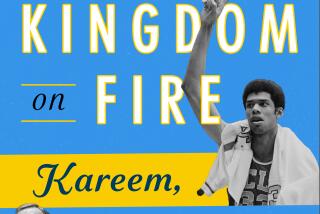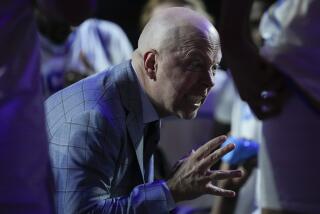IS THERE A DOCTOR IN THE SHOP? : Scholarly Auto Internist Werdon Gets His Students in Gear--in Class at Monroe and in the Pits at Saugus
- Share via
The third-period bell rings in the Monroe High auto shop, roll is quickly called and the chatter immediately begins:
“Doc. . . . Hey, Doc. How does this joint come off?”
“Doc, can I borrow your air hose?”
“Doc. . . . Where’s Doc? Hey, Doc. We got the wrong brake pads!”
Glen Werdon, auto shop teacher at Monroe since 1990, sometimes must feel as if he’s the straight man in a Bugs Bunny cartoon.
“I used to have them call me Glen,” Werdon said, “but I just couldn’t stand that. And Mr. Werdon--that was my dad.”
Thus Werdon, 50, who holds a doctorate in industrial psychology yet presides over the workshop with a folksy charm, is affectionately known as Doc to all who enter Room S-5. And all are welcome to pop in and say hello or drive up with a knock under the hood.
“What’s up, Doc?”
Plenty. Foremost, there is Werdon’s race car, a 1971 Chevrolet Chevelle, beat up and jacked up in the middle of the noisy shop, ready and waiting for repair. Two weeks ago at Saugus Speedway, Werdon, in his fourth year at the speedway, was involved in a Pro Stock heat-race crash.
The car sustained severe rear-end damage. But it’s nothing that two hours of auto shop, five days a week won’t correct.
Werdon’s pit crew is composed of a handful of his advanced students--those who best handle a wrench and best maintain their attendance. Since Werdon Racing, the team’s official name, began in 1989 when Werdon was auto shop teacher at University High, the team has not failed to put the car back on the track for the next scheduled race.
For Werdon, that race is Saturday night, the next scheduled running of the Pro Stock division at Saugus.
“I thought, ‘We need something in the class to center everyone’s focus on,’ ” Werdon said. “I bought this car, brought it to the shop and said, ‘We’re gonna tear this car apart and make it a race car.’ We bought a catalogue and started ordering things left and right.”
Student reaction has been enthusiastic. Helping hands are many, and as soon as Werdon gives the word students head for the nearest power tool to begin their grimy labor of love.
“It was pretty boring before Doc got here,” said senior Kevin Mesirow, a crew regular. “He brought in the race car and everyone loves working on it. Some people do body work. Some people help with the welding. It makes you feel good to be a part of a team.”
“Hey, Doc. I need a wrench.”
One might wonder if Doc needs his head examined.
Despite the boundless enthusiasm of his students, Werdon, a native of Pasadena and resident of Canyon Country, has found racing success slow in coming and finances, at times, overwhelming.
“I race with ‘Monroe High School’ on the side of my car, but I spend all my own money on the car,” Werdon said. “This car takes all my paycheck. Thank goodness my wife is working.”
Werdon has yet to win a main event and currently is 24th in points among 53 drivers. His best finishes this season were fifth in an oval main event and third in a figure-eight main.
Moreover, Werdon’s resume appears sufficient to land a high-paying, white collar management position. Even before earning his doctorate in 1989 from William Lyon University in San Diego, Werdon worked for three years for Chrysler Corp. as a program coordinator for Southern California dealerships.
He also served a two-year stint as a technical adviser for an auto dealership in Burbank and worked for five years as a maintenance manager for the Southern California Rapid Transit District in charge of 102 mechanics, seven supervisors and the operation of 360 buses.
He gave it all up in 1981 to own and operate a farm in Lancaster. But when the farm went bankrupt in 1984, Werdon decided to pursue a teaching career. After earning a Master’s degree in vocational education from Cal State Los Angeles in 1985, he began teaching at University in 1987.
Even Werdon readily acknowledges, “I could be making some decent money.”
But at the risk of having his checkbook routinely in the red, Werdon happily keeps his fingers black beneath the nails.
“Last year, some guy from a radio station stuck a microphone in my face and said, ‘You have a Ph.D. degree. Why are you doing this?’ ” Werdon said. “I told him that whatever you do in life is No. 1--put all your effort into it. I’ve worked for Chrysler and all the companies. And this, I’ve found, is where it is: It’s young people, trying to teach them how to do something, trying to get them interested in something that can change their lives. These kids are not going to go to college. They don’t even want to go to college. They need to learn something that they can use to make a living and to have a family.
“I think these kids see that I have a purpose in life and I don’t regret it. And I think they’re drawn to that.”
And he to them.
“Hey, Doc. This piece doesn’t fit.”
“He’s been a tremendous asset to the whole student body,” Monroe Principal Joan Elam said. “You have to appreciate that nowadays we try every way possible to entice young people to stay in school. The race car is a real hook.”
The heat-race crash occurred May 30, after Werdon had qualified for the pole position for the evening’s figure-eight main event. Instead, he watched the race from the pits, sitting beside his wide-eyed crew and his battered car that bears the school’s red, white and blue colors.
Werdon, however, is undaunted. “We just need a little luck to go our way and we’ll be right there,” he said. “We’re fighting against professional teams, trying to do it with a high school team. It’s awfully hard, but I think we’re doing great.”
All things considered.
Budgetary cutbacks in the Los Angeles Unified School District have resulted in limited funding for auto shop and other industrial arts in recent years.
“It affects all subjects, but it affects shops more because they are not a required subject,” said Gene Lew, the district’s industrial arts teacher adviser.
As a result, Werdon often is on the phone in his office until 9 p.m., searching for spare auto parts--either through donations or thrifty purchases--just to keep the auto shop in working order. Money for emergency purchases often comes from Werdon’s pocket.
“He has a lot of dedication and that’s something that most teachers don’t have,” Mesirow said. “He cares about everybody. If someone’s in trouble, Doc’s right there. If someone needs money for lunch, Doc will give it to them.”
All of which leaves even less money for Werdon’s race car. Last season, in which Werdon finished 21st among the top 25 in the Street Stock points standings, Werdon estimates he spent $22,000 of his own money while pocketing only about $1,200 in racing earnings.
Werdon purchased his first race car after selling his 1979 Corvette for $7,400.
“I needed the money to get this thing going,” Werdon said simply.
Susan Werdon, who works as an insurance underwriter in Sepulveda, said that her husband’s racing “sometimes can be really hard” on the couple.
“But I’m really proud of him,” she said. “I thought he would be a wonderful teacher. I think it’s about time somebody helps these kids in one way or another. It would just be nice if they paid teachers what they’re worth.”
Rewards for Werdon come in other forms. Advanced degree or no, he is the unmistakable efficiency expert among his students.
Steven Wall, a 1990 University graduate and former Werdon crew member, is now majoring in mechanical engineering at Iowa State after a “once-in-a-lifetime” experience of working with Werdon.
“What I learned most from Doc was not to be scared of any project, to go for project-type goals,” Wall said. “He’s extremely hands-on and he backs it up with book work. Just take the parts in your hands and go for it.”
Wall said he recently became involved with an association of automotive engineers at Iowa State and most likely will continue in the field as a career. How many will follow a similar route, not even Werdon knows. But he’s ever available with a wrench and a word of guidance.
“As long as there is a youngster here who wants to come in with a rattle in his car, he’ll work with them,” Elam said. “He’s here early and he stays late.”
Third period ends and is immediately followed by another class of advanced students. And another chatty roll call.
“Here, Doc.”
In the rear of the class, Werdon spies an unfamiliar face.
“Hey, you there in the back. . . . Who are you? You visiting with us today? What’s your name?”
Barely audible, a voice answers:
“Eric.”
Werdon cocks his ear for clarification.
“Eric?”
“Yeah.”
“OK,” Werdon says. “Glad to have you, Eric.”






